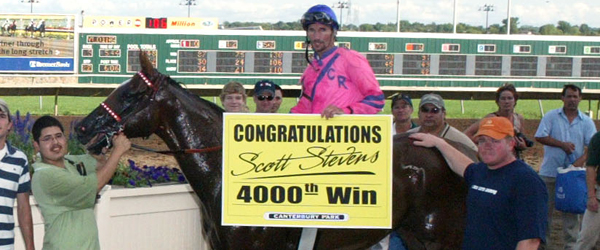
Scott Stevens had just ridden his first winner of the current meet at Canterbury Park and stepped off the scales in the winner’s circle. A fan kept vying for his attention and got it an instant before Stevens bounded down the stairs to the jockeys’ lounge.
“Great start,” the railbird said.
“It’s a start,” Stevens responded.
Stevens was already relegating what had just occurred to the past. He had finished this book and was locating a spot for it on a very crowded shelf.
Stevens,50, has always professed that a man has to live in the moment, especially in his profession. It is not wise to linger on past accomplishments with another challenge only 25 minutes away.
Win or lose, stay in the moment, because one leads to the next and then to another. It’s dangerous business in raceriding to be trapped in what happened a furlong back while mounted on a thoroughbred traveling 35 miles an hour. Things happen much faster up there, on a horse’s back, then they do on the ground. A jockey can miss an opportunity, a hole here or there, a chance that can make the difference between winning and running second, third or worse, if his mind is not in the moment, focused on the race at that instant while anticipating what might happen the next.
Worse yet, he could wind up in a heap on the ground in a flash so quick he recalls only white light.
Stevens knows all about that, much too well.
Last July 2, he lay in just such a heap, in such questionable condition that a medical helicopter was summoned for the first time in Canterbury Park history after a horrendous spill left his life in question. It wasn’t certain for several days that he would survive. Then, only weeks later, he began making short appearances at the track during race cards, hobbled to be sure, but on his feet. Still, the talk lingered. “He won’t ride again… will he? He’s not apt to bounce back from this episode. I hope he hangs it up.”
Only two summers earlier, he had been kicked by a horse and left Canterbury with a damaged knee requiring surgery when he got home to Phoenix.
Yet, he would have nothing to do with the notion of hanging it up. He left Canterbury when the meet concluded last summer hoping to be in the saddle for opening day at Turf Paradise in Phoenix on Oct. 1.
He made it on Nov. 12.
Despite those missed weeks, he finished fourth in the riding standings with 77 wins. His winning percentage, more than 22 percent, was the highest of his career for a meet. He rode only 345 horses but ”(agent) Chad (Anderson) did a great job of picking them,” Stevens said. “Some days I was on only three and all three won. There were days when I rode only one and it won.”
He managed to add another significant win to the trophy case at the same time, winning the Phoenix Gold Cup, the track’s preimer event, on Wiredfor220 for trainer by Bart Hone.
Stevens doesn’t want to ride as much as he once did. Two or three on a card. Some days perhaps one. Time and injuries too numerous to recall have taken a toll.
His goal, as it has been for some time, is still to win at least one race a day. He is 7-for-10, three short, in the current meet.
Yet he commands the respect of trainers and horse owners alike. “He’s probably the smartest rider on the grounds,” one conditioner said the other morning.
“He can tell you more about a horse and what it needs than any of the riders coming up today,” said trainer Joe Merrick. “He knows what makes them tick. Riding him is a no brainer.”
Stevens can’t imagine not riding, not now, not last summer when he deparated Shakopee.
Nothing was going to deter him. Not the painful ensuing months, the long, agonizing sessions of physical therapy, the hours of re-conditioning his debilitated body aboard his homemade mechanical horse (named Bob because that’s what its head does) could change his mind.
He’d begin the day at 7 a.m. in physical therapy that often continued until 11 a.m. “Then I’d go home and ride the mechanical horse for an hour or more,” he said.
Stevens would turn on the televisvion to TVG and ride while watching a race. That way he could time how long he had ridden.
Riding “Bob” is more strenuous than riding an actual horse, according to Stevens. “There’s nothing pulling against you to keep your balance. The thing is springloaded and if you aren’t careful, you’ll get popped in the face by that (bobbing) head.”
Clearly, Stevens intended to ride again.
He summed up that reality in succinct fashion the other day.
“This is what I do,” he said.
He hasn’t give the future much thought. Will he train, leave the game altogether?
“I’m still very thankful that I can ride,” he said. “I’m not ready to quit.”
And the future?
“I don’t know what I’ll do,” Stevens said.
“It’s a day at a time.”
